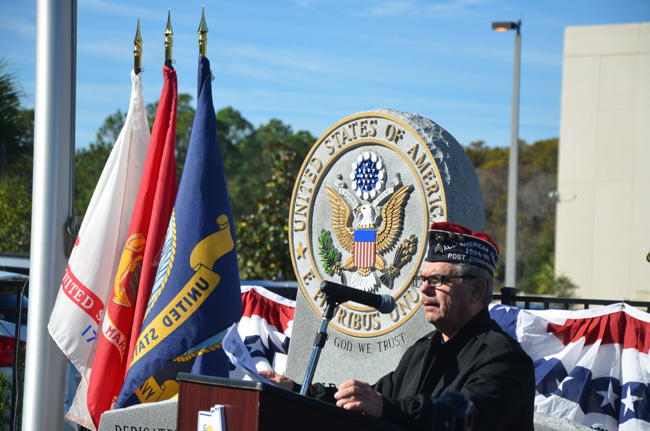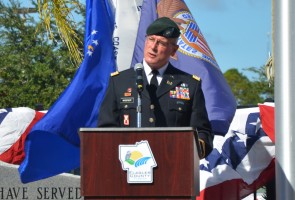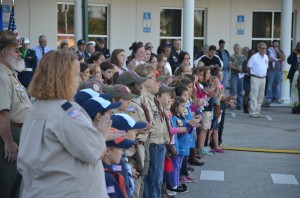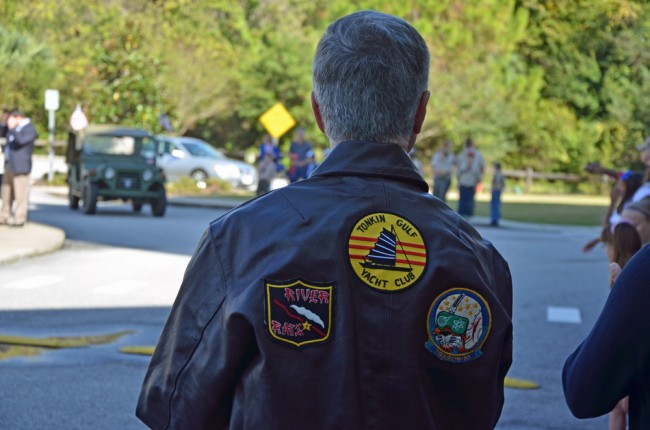
The war that would eventually end, 20 million deaths later, with Armistice Day—and what became Veterans Day—began 100 years ago this fall when German soldiers set foot on Belgian soil, triggering what historian Barbara Tuchman described as “the brutal, mud -filled, murderous insanity known as the Western Front that was to last for four more years.”
As Lt. Col. Mark Widener of the Florida Army National Guard put it before a Veterans Day assembly this morning in front of the Government Services Building in Bunnell, that “war to end all wars” had shaken the world for four years before the armistice “was signed on the 11th hour on the 11th day of the 11th month” in 1918. “Since then, nations have commemorated that event with a moment of silence.”
Before Widener got to that brief moment of silence, he provided what amounted to a portrait of veterans serving now or who have served in the past, with special emphasis on his own branch of the service. “The National Guard and its predecessor, the militia units, have fought in every national war and campaign,” Widener said. “The Guard has a long tradition of combat service, and also for serving our local communities in times of emergency and need.”

There were also moments not of silence but of unintended irony as Widener at one point traced back a fraction of the history of wars and battles that have engaged this country all the way back to Lexington, Concord and Gettysburg, the trenches of the Western Front, then the high seas of the Pacific and the Atlantic, the landings at Anzio and Normandy, Okinawa, Korea, Vietnam, Grenada, Kuwait, Iraq, and now Afghanistan: “The list is too extensive to name them all,” Widener said.
It is also ongoing.
“Silence does not come easy in America,” Widener said near the end of his speech. “It is perhaps not in our nature to be still or silent. And the world itself is neither quiet or peaceful. Maybe that is why such a small gesture can hold such meaning. A brief rest in the midst of our chaotic existence. A hushed respite in which one can reflect upon what truly matters.”
The moment, which in Europe usually stretches to a full minute, lasted just 15 seconds at this morning’s ceremony—as if to reflect the very unease with silence Widener had just spoken of.

Numerous other officials from every local government except Bunnell attended, among them the sheriff, County Judge Melissa Moore-Stens and Circuit Judge J. David Walsh, who wore a jacket that bore the marks and memories of his service as an airman in Vietnam, where he flew some 200 missions during the war’s deadliest years, between 1969 and 1971. And of course veterans were in attendance, representing every local veterans organization, along with youth groups such as the Flagler County Golden Sands Girl Scouts troupe and Flagler County Cub Scouts.
In her brief remarks Mealy quoted a phrase that Ronald Reagan was fond of speaking since he first uttered it to a Kiwanis Club assembly in 1964: “Freedom is never more than one generation away from extinction. It has to be fought for and defended by each generation.” He would speak those words in one variation or another more than a dozen times as president—whether in the context of discussing the resignation of his chief of staff or while standing before crowds in Berlin or the British Parliament, at the swearing in of Supreme Court justices or again, in his next-to-last use of the phrase as president, before a convention of Kiwanis International—on July 6, 1987, when he quoted himself using the phrase a generation earlier.
![]()






























Leave a Reply